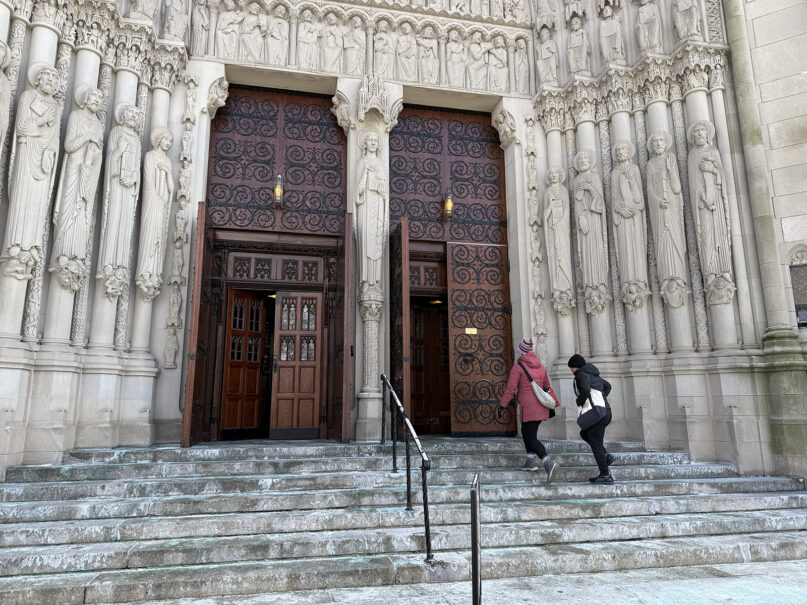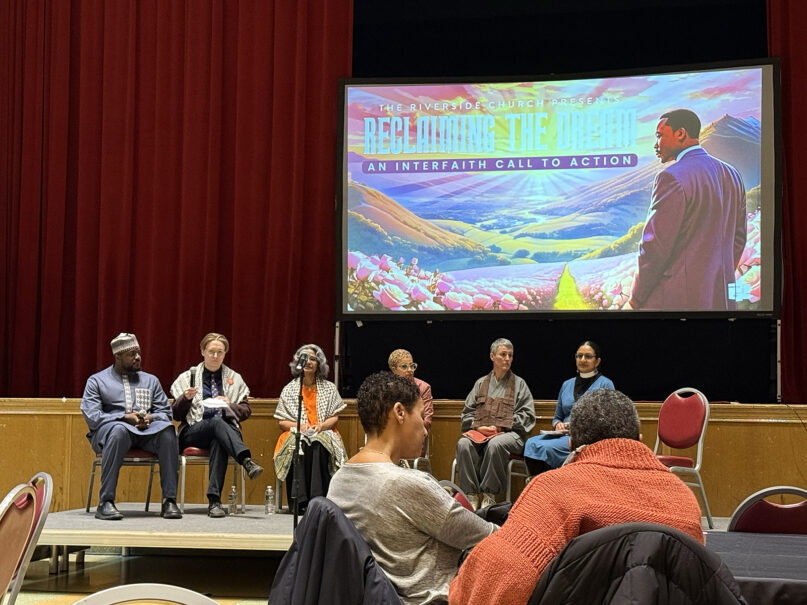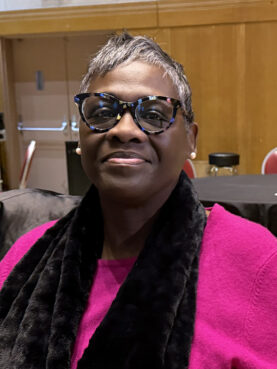NEW YORK (RNS) — When Inauguration Day lands on Martin Luther King Jr. Day, the celebrations are going to produce some crosscurrents, no matter who is being sworn in as president. But at Riverside Church, the soaring nondenominational sacred space founded in the late 1920s by oil magnate John D. Rockefeller — a sort of Elon Musk of his day — it was not lost on anyone at an interfaith, social-justice-oriented King Day commemoration that some “heart stretching” would be required.
That was the work the Rev. Sarah Dojin Emerson, a Soto Zen Buddhist teacher from the Brooklyn Zen Center, gave the group, asking those gathered where King delivered his 1967 speech against the Vietnam War to pray for the well-being of “challenging people we may disagree with.”
“Let’s see if we can stretch the heart to offer them well-being,” Emerson instructed the crowd. “May they feel deeply loved and cherished, and may this impact them so deeply that their words and actions are shaped by love.”
Some attendees did better than others. “I just can’t get that contrast into my head,” said Rabbi Michael Feinberg, executive director of the Greater New York Labor-Religion Coalition. “Prophetic leadership, versus criminal con man.”
Yet Feinberg called the small community at Riverside an “antidote” to any cynicism or negativity. “I’m trying to focus on the hopeful side, the faith-based side, the community, the social justice vision,” he said, “because we’re going to need it.”
The event, titled Reclaiming the Dream and billed as a “courageous conversation of radical hope,” drew faith leaders from the Islamic, Evangelical Lutheran, Hindu, Sikh and Buddhist traditions to discuss the vision King had of a “beloved community,” in which the dignity of every person regardless of race, religion or creed is respected.

One of the panelists, Imam Ammar Abdul Rahman, said King’s beloved community was no “far-fetched” aspiration but rather a call to action for the faithful people of now, whatever their faith.
“This idea is just as Islamic as it is Christian,” he told the crowd, making a parallel between King’s beloved community and the Islamic idea of brotherhood, or ummah. “Which is to say, it is human,” he said.
Asked to bring King’s ideals into the present social and economic context, many panelists spoke about the most imminent issues their New York religious communities face: from housing inequity, to injustice in the prison system, to health care inaccessibility. What prevents these issues from being solved, said Rahman, is often the pervasive idea that if one is not directly impacted by an issue, one has no role in its solution.
King, whose Poor People’s Campaign aimed to advocate with government officials to improve the lives of the poor, inspired many of the panelists. “Our faiths are not just about ‘us,'” said the Rev. Tuhina Rasche, a Lutheran minister who was raised in a Hindu household. “They are about all 0f us.”

Emerson gave the example of a bodhisattva, or incarnation of the Buddha portrayed as having 10 heads and 1,000 arms, symbolizing its compassion for the whole world. “There is no such thing as ‘separate liberation’ that doesn’t include everyone.”
Emerson quoted Thích Nhất Hạnh, the Vietnamese monk who is said to have inspired King’s late anti-war stance and who died in 2022, as saying “The next Buddha will be a sangha” — in other words, she said, the next hope for humanity will be a community.
Despite the progressive leanings of those in attendance, and the events happening on the national stage, several speakers stressed the importance of reaching across divides. Sunita Viswanath, executive director of Hindus for Human Rights, said reaching out to political or ideological adversaries, even if it may bring “heat” or pain, requires interfaith leaders to “reconstruct the notion of ‘us’ to include people who share values” and not only those who share one’s identity or political persuasion.

The Rev. Kim Anderson, presiding elder of the Manhattan District for the African Methodist Episcopal Church, who was in the audience, told RNS after the event that she was challenged to think about her own role.
“If we don’t stretch the heart, if we don’t learn to love in that unconditional manner that Dr. King was talking about, then we become what we’re fighting against.”
Original Source: